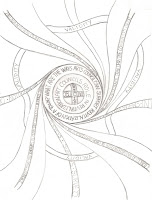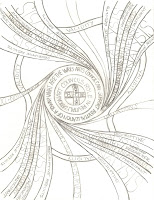 I hope there is a way to actually see this.
I hope there is a way to actually see this.
My initial interest in assessment began to change with an article discussing problems (and successes) in teaching as identified with particular personality types, and the way particular personality types reveal themselves through art making. (Danielson,1971). From then on my questions began to center on more psychological questions and ultimately on learning theories. (Grossman, 1971). I had, up until this point, been arguing heavily on perception as a major learning outcome for art education; after reading about psychological concepts as applied to the teaching of drawing (Pletcher, 1972)I am now beginning to think more about affective and behavioral issues. I teach in a rigorous academic program so perhaps my greatest teaching "gift" to the students might lie in the field of something like self-efficacy. (Bandura, 2002).
I have many questions, and they are all rather ill-formed:
Is social learning theory an especially effective teaching strategy in the art studio?
Does social learning theory have a significant benefit for the twenty-first century learner's "need" for collaboration and communication?
Can self-efficacy--a believe that one is capable of doing a specific task--in the art studio lead to an understanding of reciprocal determinism putside the art studio and is this an answerable question? How might it be answered? How are the specificities of art making--the "contingencies" of painting in particular, able to lend a new layer of ability in completing a task? (Flexibility, resiliency, motivation)
Can my behavior in the classroom set up opportunities for social learning? What exactly is my function as the "model"?
Do the merits of social learning theory align with the goals of art education?
A final question I think encompasses most of the former questions:
If social learning theory is set up as a paradigm for effective teaching practice, what patterns will emerge? How can I note and record them? Will they be validated by student experience? What influence will this have on student behavior, maturity of process, thinking, and the quality of art making? What learning outcomes--cognitive and affective-- will result?Does this has merit for a teaching agenda for the needs of twenty-first century learners?
I am very glad it is only the second week.
Bandura, A. (1994). Self-efficacy. In V. S. Ramachaudran (Ed.), Encyclopedia of human behavior (Vol. 4, pp. 71-81). New York: Academic Press. (Reprinted in H. Friedman [Ed.], Encyclopedia of mental health. San Diego: Academic Press, 1998).
Grossman, Marvin. (1971). Art Attitudes and Teaching Behavior. Studies in Art Education, 12(3), pp. 64-66.
MacGregor, R. (1972). The Development and Validation of a Perceptual Index for Utilization in the Teaching of Art. Studies in Art Education, 13(2), pp. 11-18.
Pletcher, R. (1972). Teaching Method, Art Strategy Types and Learning in Art. Studies in Art Education, 14(1), pp. 59-65.


















